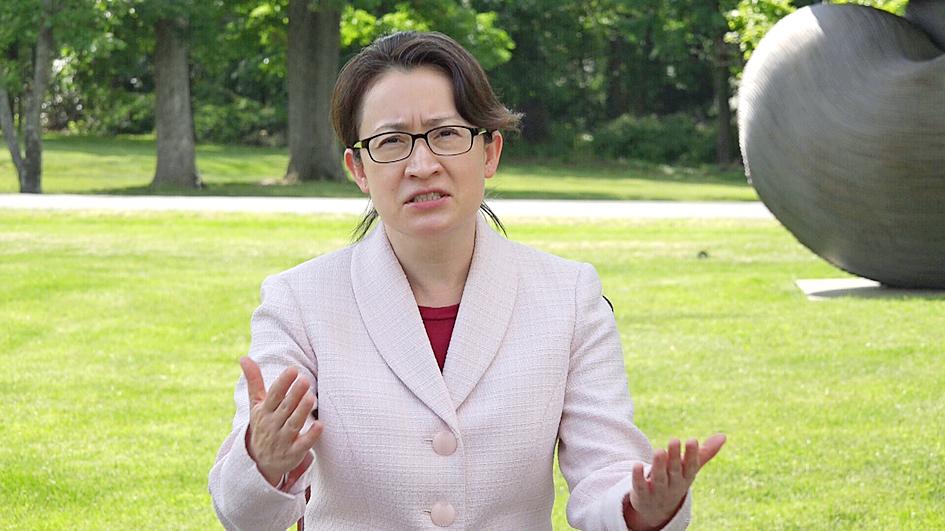Taiwan is willing to partner with members of the Quadrilateral Security Dialogue (Quad) and can play an important role in addressing key issues that the group hopes to tackle, Representative to the US Hsiao Bi-khim (蕭美琴) said on Thursday.
The Quad was to hold its first in-person summit yesterday.
The issues — climate change, COVID-19, the restructuring of supply chains and regional security — are Taiwanese interests, Hsiao told India’s Tv9 Telugu, which identified her as “Taiwan ambassador” to the US.

Photo: CNA
Taiwan seeks to establish partnerships with Quad member states, and other like-minded nations in the region, to address these issues, she added.
Taiwan and India have many common interests on which they could collaborate, such as technology and manufacturing, she said.
They could also work together on vaccine manufacturing, as India has demonstrated its resilience to the COVID-19 pandemic with its robust vaccine production, she said.
Asked about Taiwan’s “secret” to resisting China, Hsiao said that Taiwan just wants to survive and that its democracy had been hard-won with many sacrifices.
Taiwan has created a strong economy backed by legal institutions, and has also performed well in technology and other sectors, she said.
Taiwanese love freedom, and want to survive and defend that freedom, she said, adding that it is not looking for a fight, but wants to freely interact with other nations.
US-Taiwan relations are “rock solid”, and both nations share similar values and interests, such as democracy and liberty, as well as the safety and economic prosperity of the Indo-Pacific region, Hsiao said.
Bilateral ties have improved greatly over the past few years, as the nations collaborate on economic and security issues and support democracy, she said.

CHAOS: Iranians took to the streets playing celebratory music after reports of Khamenei’s death on Saturday, while mourners also gathered in Tehran yesterday Iranian Supreme Leader Ayatollah Ali Khamenei was killed in a major attack on Iran launched by Israel and the US, throwing the future of the Islamic republic into doubt and raising the risk of regional instability. Iranian state television and the state-run IRNA news agency announced the 86-year-old’s death early yesterday. US President Donald Trump said it gave Iranians their “greatest chance” to “take back” their country. The announcements came after a joint US and Israeli aerial bombardment that targeted Iranian military and governmental sites. Trump said the “heavy and pinpoint bombing” would continue through the week or as long

TRUST: The KMT said it respected the US’ timing and considerations, and hoped it would continue to honor its commitments to helping Taiwan bolster its defenses and deterrence US President Donald Trump is delaying a multibillion-dollar arms sale to Taiwan to ensure his visit to Beijing is successful, a New York Times report said. The weapons sales package has stalled in the US Department of State, the report said, citing US officials it did not identify. The White House has told agencies not to push forward ahead of Trump’s meeting with Chinese President Xi Jinping (習近平), it said. The two last month held a phone call to discuss trade and geopolitical flashpoints ahead of the summit. Xi raised the Taiwan issue and urged the US to handle arms sales to

State-run CPC Corp, Taiwan (CPC, 台灣中油) yesterday said that it had confirmed on Saturday night with its liquefied natural gas (LNG) and crude oil suppliers that shipments are proceeding as scheduled and that domestic supplies remain unaffected. The CPC yesterday announced the gasoline and diesel prices will rise by NT$0.2 and NT$0.4 per liter, respectively, starting Monday, citing Middle East tensions and blizzards in the eastern United States. CPC also iterated it has been reducing the proportion of crude oil imports from the Middle East and diversifying its supply sources in the past few years in response to geopolitical risks, expanding

OTHER OPTIONS: Given possible US intervention and Taiwanese counterattacks, China might opt to blockade Taiwan or take its outlying islands instead of an all-out invasion A US think tank has urged Taiwan to adopt a “hellscape” strategy that would flood the Taiwan Strait with drones and other uncrewed systems to deter invasion by China. In its report, Hellscape for Taiwan, published on Thursday, the Center for a New American Security said Taipei’s asymmetric defense approach — often described as a “porcupine strategy” — needs to evolve to keep pace with the growing capabilities of the Chinese People’s Liberation Army. The “hellscape” strategy involves saturating the air and waters around Taiwan with thousands of drones and other platforms capable of striking invading forces from multiple domains at once. Long-range